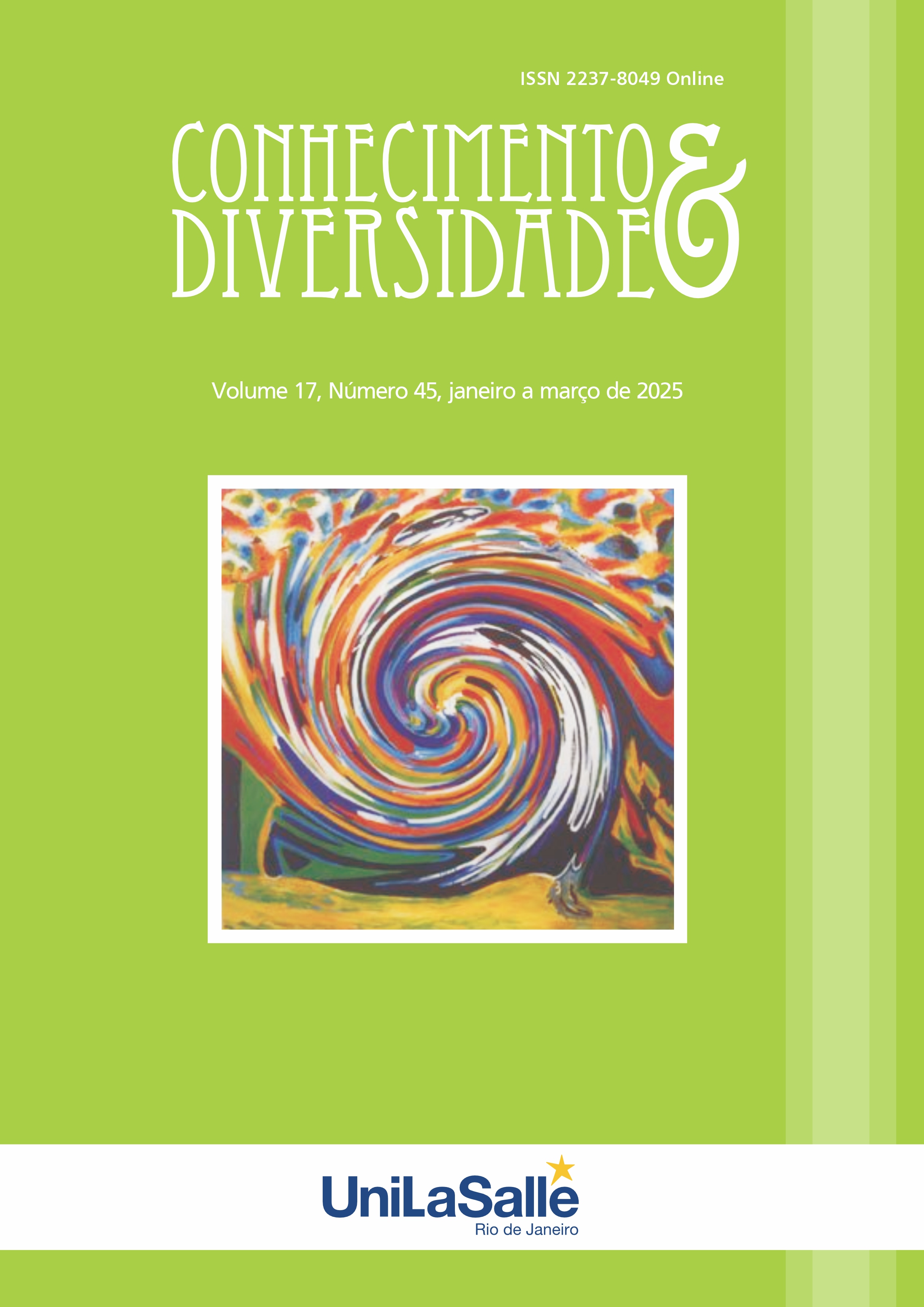TRANSFORMANDO A INSTRUÇÃO DE LEITURA
ADOÇÃO DE ESTRATÉGIAS METACOGNITIVAS POR PROFESSORES SAUDITAS
DOI:
https://doi.org/10.18316/rcd.v17i45.12355Palavras-chave:
Inglês como Língua Estrangeira, instrução de leitura, desenvolvimento profissional, crença dos professoresResumo
Este estudo explora as preferências dos professores sauditas de EFL pela abordagem de estratégia metacognitiva na instrução de leitura e identifica fatores que influenciam sua adoção. Uma pesquisa foi conduzida entre 78 professores sauditas de EFL para avaliar suas preferências pela abordagem de estratégia metacognitiva e os desafios associados à sua implementação. As descobertas revelaram uma forte preferência pela abordagem de estratégia metacognitiva, com 81,7% dos professores favorecendo seu uso devido à sua eficácia em melhorar a compreensão da leitura e promover o aprendizado independente. No entanto, vários desafios, incluindo treinamento limitado, currículos rígidos e barreiras culturais, foram identificados como obstáculos significativos à sua adoção. O estudo ressalta a importância de programas de desenvolvimento profissional direcionados e reformas curriculares para facilitar a integração de estratégias metacognitivas na instrução de leitura. Ele também recomenda mais pesquisas sobre o impacto de longo prazo e a aplicação em sala de aula dessas estratégias.
Referências
Ali, A. M., & Razali, A. B. (2019). A review of studies on cognitive and metacognitive reading strategies in teaching reading comprehension for ESL/EFL learners. English Language Teaching, 12(6), 94–111.
Al-Khresheh, M. H., & Al Basheer Ben Ali, R. (2023). A mixed method study on the metacognitive awareness of reading strategies used by Saudi EFL students. Journal of Pedagogical Research, 7(4), 30–47.
Al-Kiyumi, O., Seyabi, F. A., & Hassan, A. H. (2021). An empirical study on the effect of instruction on metacognitive strategies on EFL reading comprehension: The case of foundation-level students in Oman. International Journal of Learning, Teaching and Educational Research, 20(1), 220–235.
Al-Nujaidi, A. H. (2003). The relationship between vocabulary size, reading strategies, and reading comprehension of EFL learners in Saudi Arabia [Doctoral dissertation, Oklahoma State University].
Al-Qahtani, A. A. (2020). Investigating metacognitive think-aloud strategy in improving Saudi EFL learners' reading comprehension and attitudes. English Language Teaching, 13(9), 50–62.
Alrabai, F. (2017). Exploring the unknown: The autonomy of Saudi EFL learners. English Language Teaching, 10(5), 222–233.
Al-Seghayer, K. (2014). The four most common constraints affecting English teaching in Saudi Arabia. International Journal of English Linguistics, 4(5), 17–26.
Althewini, H. A. (2016). Teachers’ beliefs about the teaching of reading in English to young learners in Saudi Arabia [Doctoral dissertation, University of Exeter].
Borg, S. (2003). Teacher cognition in language teaching: A review of research on what language teachers think, know, believe, and do. Language Teaching, 36(2), 81–109.
Borg, S. (2006). Teacher cognition and language education: Research and practice. Continuum.
Grabe, W. (2009). Reading in a second language: Moving from theory to practice. Cambridge University Press.
Grabe, W., & Stoller, F. L. (2002). Teaching and researching reading. Pearson Education.
Kan, T., Noordin, N., & Ismail, L. (2024). Implementation of metacognitive reading strategies to improve English reading ability: A systematic review. International Journal of Learning, Teaching and Educational Research, 23(7), 368–389.
Koda, K. (2005). Insights into second language reading: A cross-linguistic approach. Cambridge University Press. Management, 22(17), 3528-3549. https://doi.org/10.1080/09585192.2011.560878
Meniado, J. C. (2016). Metacognitive reading strategies, motivation, and reading comprehension performance of Saudi EFL students. English Language Teaching, 9(3), 117–129.
Semerci, N. & Semerci, Ç. (2004). "Türkiye'de Öğretmenlik Tutumları", Fırat University Journal of Social Sciences, S. 14 (1), pp. 137-146.
Sunay, H. (1998). The importance of physical education teacher and coach in sports education infrastructure. Gazi Journal of Physical Education and Sport Sciences, 3(2), 43-50.
Tümkaya, S., & Uştu H. (2016). The relationship between burnout and professional commitment: a research on classroom teachers. Mersin University Journal of Faculty of Education, 12(1), 272-289. https://doi.org/10.17860/efd.48453
Uştu, H. (2014). Investigation of the Levels of Classroom Teachers' Professional Commitment, Turnover Intention and Sociodemographic Characteristics of Organisational Commitment. Master's Thesis, Çukurova University.
Wallace, J. E. (1995). Organisational and professional commitment in professional and nonprofessional organisations. Administrative Science Quarterly, 40(2), 228-255.
Yap, M., Cukier, W., Holmes, M. R. & Hannan, C. A. (2010). Career satisfaction: A look behind the races. Relations Industrielles/Industrial Relations, 65(4), 584-608. https://doi.org/10.7202/045587ar
Yavas, U., Karatepe, O. M., & Babakus, E. (2013). Correlates of nonwork and work satisfaction among hotel employees: Implications for managers. Journal of Hospitality Marketing & Management, 22(4), 375-406.
Yazicioglu, Y., & Erdogan, S. (2004). SPSS Applied Scientific Research Methods. Ankara: Detay Yayincilik, 49-50.
Yıldız, S. (2020). Development of commitment to teaching profession scale. Anemon Muş Alparslan University Journal of Social Sciences, 8(2), 463-482.
Zhang, L. J., & Seepho, S. (2013). A review of studies on cognitive and metacognitive reading strategies in ESL/EFL contexts. English Language Teaching, 6(10), 1–16.
Downloads
Publicado
Edição
Seção
Licença
Copyright (c) 2025 Abdulaziz Althewini

Este trabalho está licenciado sob uma licença Creative Commons Attribution 4.0 International License.
Conforme recomendado pelo o Public Knowledge Project, a RCD adota para seus artigos uma licença CREATIVE COMMONS: Atribuição CC BY 4.0.
Esta licença permite que outros distribuam, remixem, adaptem e construam sobre o seu trabalho, mesmo comercialmente, desde que lhe dêem crédito pela criação original.
Esta é a licença mais adequada oferecida.
Recomendado para a máxima divulgação e uso de materiais licenciados.



